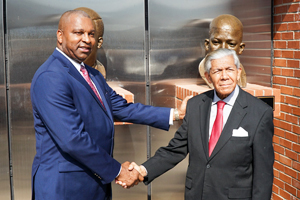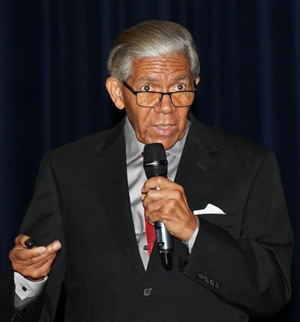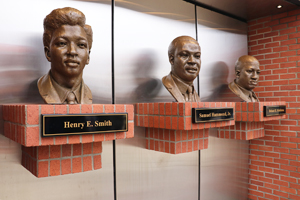
Special to The Truth
The tragic events of February 1968 in Orangeburg are clear in the mind of renowned Civil Rights Era photographer Cecil Williams 55 years after the fact.
“I remember every minute, every moment, every day and every face that I came upon,” Williams said Wednesday, Feb. 8, 2023, at South Carolina State University’s commemoration of the Orangeburg Massacre’s 55th anniversary. “We photographers have a natural ability to remember events and people and circumstances just a little bit better than most people
because we take pictures all the time.
“With our cameras, we photographers freeze moments in time. Every time we take a picture we capture a slice of life,” he said.

Williams was the keynote speaker for Wednesday’s event in SC State’s Martin Luther King Jr. Auditorium. He documented the series of events that culminated in the police shooting deaths of three young men on the SC State campus on Feb. 8, 1968 – known today as the Orangeburg Massacre.
Henry Smith, Samuel Hammond and Delano Middleton were killed when police opened fire on some 200 unarmed Black students who were demonstrating in the name of integrating a local bowling alley. Another 28 protestors were wounded. Smith and Hammond were both enrolled at SC State, and Middleton was a 17-year-old student at Wilkinson High School in Orangeburg.
Each year on Feb. 8, the university honors Smith, Hammond and Middleton, their families and Orangeburg Massacre survivors. Representatives of the Smith, Hammond and Middleton families were present at Wednesday’s commemoration and took part in a flame lighting ceremony at the campus monument enshrined with bronze likenesses of the three men.
Also attending the commemoration were several survivors of the shootings. Williams recognized them as “genuine American heroes.”
“You stand on their shoulders,” Williams said. “We owe them a great debt. We owe them respect. We hold them to the highest honor.

“We owe them no less than to be recognized perpetually as heroes who hold to this country’s Constitution so that all people, regardless of their race or color, will be recognized as 100% citizens of this great democracy we call America,” Williams said.
The theme for Wednesday’s commemoration was “Black Resistance.”
“It was Black resistance and Black persistence that was needed to bring down the walls of segregation in Orangeburg, South Carolina, and throughout the state and throughout the nation,” Williams said.
Williams later spoke of the sacrifices made in that resistance.
“We must never forget that some paid with their blood and loss of life,” he said. “It is indelibly stamped on all of us who were there that this was Black resistance – just like our theme today.
“We’ve been fighting for a long time – for 400 years – in this country for freedom, justice and equality. By now, it should be something that’s understood, but we still have a ways to go before we live in a colorblind society,” Williams said.
Williams, whose work is collected in the Cecil Williams South Carolina Civil Rights Museum in Orangeburg, concluded his remarks with a slideshow presentation of photographs he took in 1968 along with those of other photographers who documented the massacre itself. One slide questioned how far the nation has come from the events of 1968 in light of the recent deaths of George Floyd, Tyre Nichols and others at the hands of law enforcement.
SC State President Alexander Conyers thanked Williams for sharing his perspective and for “bringing us up to date.”
“Because 55 years later, we are still dealing with similar situations,” Conyers said.
